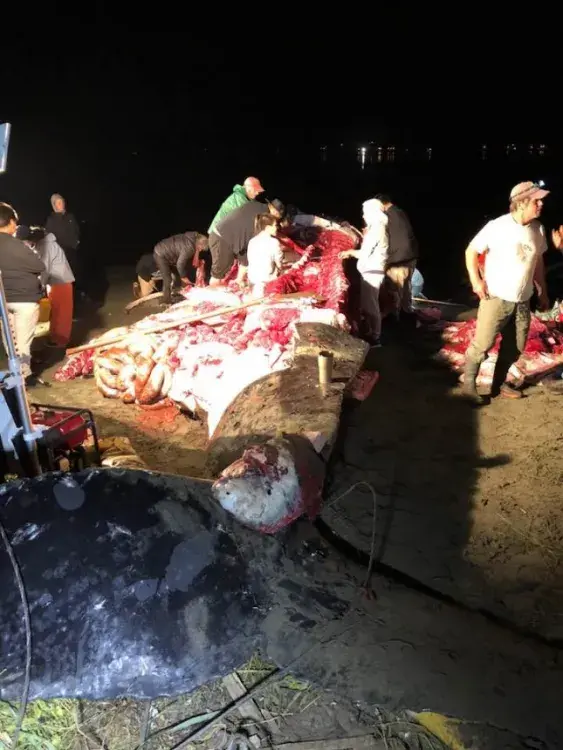Excitement was in the air at Neah Bay as Makah Tribes members of all ages came to witness and even take part in the flensing of whale that was found drifting offshore.
According to a video statement made by Makah Tribal Chairman Nate Tyler, the dead humpback whale was discovered floating offshore at about 10 a.m. Thursday, Aug. 23. Along they’re south of the US border, the Makah are considered Nuu-chah-nulth, as they share a common ancestral language, history and culture with their nearby tribes on western Vancouver Island.
The whale was reported by NOAA (National Oceanic and Atmospheric Administration, U.S.A.) officials to Makah Tribes Marine Mammal Biologist Jonathan Scordino.
Scordino went out to assess the humpback whale which was subsequently towed to a Makah Tribes beach. From there the carcass was examined and tissue samples were taken for scientific testing. It is believed that the whale was a victim of a boat strike.
“The whale is believed to be hit by a freighter,” said Makah member Wallace Perry, who shared photos of the whale through social media.
“Our community turned out to welcome the whale, and pray,” he said, adding that the whale arrived just in time for the start of Makah Days, which runs Aug. 24-26.
Makah Tribal member Jason Roberts shot video of the event. In it, you can see test samples being taken as the community gathers around carrying lanterns and lights. The children are whooping and singing, some reaching out to touch the whale.
Once the test samples were taken, Makah members stepped forward with specially made tools to begin the flensing, or removal of the blubber.
Tyler can be heard telling the camera man that some of the butchers took part in the 1999 grey whale harvest. “I believe they went to Alaska,” he said, where they learned to butcher whales. “They have the skills and they have the tools.”
That was the first whale the Makah hunted in over 70 years, and since then there has been some other salvaged whales that were harvested. Under international and domestic US law, the Makah have the right to hunt and harvest whales, in accordance with their treaty rights.
When asked what the plan is, Tyler said that once it’s determined that the whale is safe to eat, it will be portioned out and given to community members.
But some couldn’t wait for the test results. A girl is seen eating a raw piece of whale meat while community members are carrying away bags of meat.
They say that this is an extra special gift, just in time for Makah Days.







